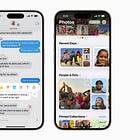You can’t innovate away loneliness
Why should we trust big tech to fix the problem it created?
Embedded is your essential guide to what’s good on the internet, written by Kate Lindsay and edited by Nick Catucci.
When I say big tech, I of course don’t mean my perfect little emails to you. — Kate
On July 30th—World Friendship Day—web developer Avi Schiffmann released Friend, an AI wearable that is “always listening” and responds to everything it hears via personalized texts, like a real friend talking to you. “Friend is an expression of how lonely I've felt,” Schiffmann wrote upon launch. The tweet got a huge reception, but not the one Schiffmann likely intended.
People thought, or maybe hoped, the ad for the launch was a parody. Because if this product is real, then what has this world come to? The idea of an AI “friend” is not only dystopian, it’s also painfully ironic. Why would I shell out $95 for a product made by the very industry responsible for the problem it now claims to solve?
Surveys, headlines, and anecdotes tell us that we are experiencing an epidemic of loneliness. People are having trouble making friends and finding romantic partners four years out from the start of a pandemic that plunged us into isolation. Tech started as the solution to this problem, connecting us to everything from loved ones to food deliveries. It was so good, in fact, that when the opportunity to revert back to the in-person version of many of these things arose, we opted to stay online. I don’t go to an office and I still see my therapist over Zoom.
But the pandemic just accelerated a trend. Over the past decade, tech has slowly been innovating human connection into obsolescence, as I wrote when Apple released its latest update.
Anything a friend once did, apps do “better.” Instead of a friend picking you up from the airport, you summon an Uber. Instead of taking food to a sick friend stuck at home, they order Instacart. Even Venmo, making the exchange of money digital and therefore more “convenient,” has meant that friends’ shares of the bills languish for weeks unpaid, instead of being settled up—or forgiven—instantly, IRL.
Meanwhile, influencer culture, borne out of apps like Instagram, has trickled down into the way we present online. Even our digital interactions become more distant. Instead of having a direct conversation with the few friends who post a comment to, say, ask what makeup product we’re wearing in a picture, we broadcast the answer on Instagram Stories: “People have been asking! Here’s what it is!” And maybe we include an affiliate link. The friends who reach out for connection are relegated to spectators. We end up not really talking to them at all.
It’s no wonder, then, that Twitter routinely discourses about how asking a friend to do any kind of favor is “emotional labor.” It is labor—strangers now get paid via apps to do it for us—but we have extrapolated that to mean that human connection is some kind of burden. An act of love becomes a professional favor. Why inconvenience a friend when you could just pay for a car? Why spend an hour talking to a loved one when you can sit silently in a stranger’s back seat?
Meanwhile, the decline of third places means there are fewer places to just hang out and bump into each other. Other economic and social factors have surely contributed to this change, but I suspect that it’s largely due to the new third place—the one in the palm of our hands. We hang out online, which means we don’t hang out at all. There has been a push in recent years to correct this, with the rise of in-person events specifically for making friends, but I think we’re still too early in our loneliness for enough of us to admit we need something like that.
But the most annoying thing about Friend, ultimately, is that a tool like that simply cannot make us less lonely. Let’s say everyone buys one. Okay, cool—we now all have another personal device that’s with us at all times, and that we pay more attention to than the people around us. It does nothing for our relationships with other people, besides isolating us further. And people are exhausted with this. Case in point: Meta just shut down its celebrity AI chatbots due to lack of use. With any of these supposedly revolutionary tools, no matter how familiar the character they’re replicating or how colloquially the bot speaks, the human on the other end remains the same: alone.




Fascinating. Thank you!
Great articulation of the problem!